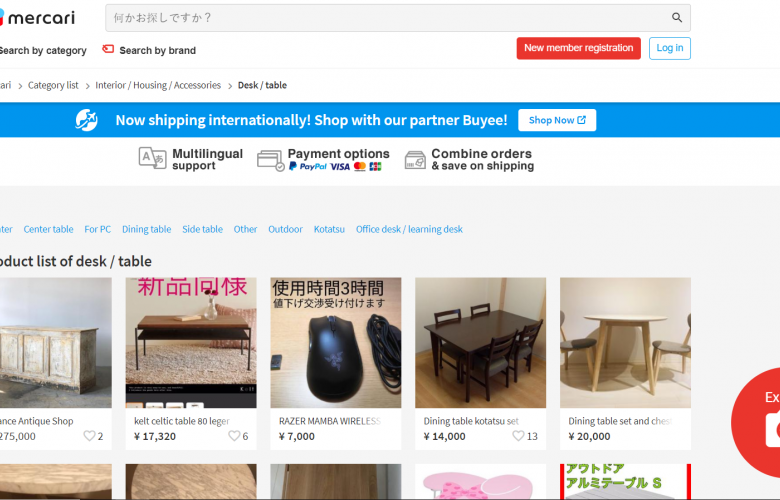Japan's online resale marketplace is a thriving hotbed of incredible bargains and top quality items. There are several factors that make the country, and Tokyo especially, such a good place to buy secondhand items. So, take advantage of it, you'll save money and the environment at the same time.
In Japan, residents have to pay to get rid of furniture and larger goods. So to save money and reduce hassle, many folks who are deciding to upgrade or are moving house offer their furniture or white goods for heavily discounted prices, and often even for free! Also, most of the items you'll find online are in near-perfect condition.
Beyond Hard-Off and a select few other vintage outlets, buying secondhand home goods isn't as widespread a practice as other nations. While a wasted opportunity for many, it's an excellent opportunity for the savvy shopper. Here's a guide to a couple of resale and recycle sites you might not be so familiar with.
Jimoti
JMTY or Jimoti launched in 2011, it was branded as the Japanese version of Craigslist, although Japan also has Craigslist. It was originally a bulletin board–style classifieds site with job listings, houses, and items for sale.
Over the years it reformed into a site and app purely dedicated to the buying, reselling and giving away of mainly household items and other everyday Japanese necessities, like bicycles. While you won't find much information about the site in English online, it's an incredibly popular resource in Japan with about 11 million visitors per month.
The site is broken up into areas, and even nearest train stations, so you can search for items near you. People list the items and the price, and similar to Craigslist, you can contact them by direct message.
Once you've found what you're looking for, message the seller directly to decide on a meeting/pick-up time and location. There's no payment system on the site; you pay cash on delivery (or pick-up). Users are peer-reviewed too for peace of mind. Although it may be trickier to navigate for non-Japanese speakers, it's a worthwhile website with some killer bargains.
Web: https://jmty.jp/
Mercari
Mercari calls itself the 'easy flea market', which is probably the aptest description for it. Available both online and in app form, it's a marketplace site for those looking to buy and sell predominantly secondhand goods. However, some more entrepreneurial folk also use it as a regular e-commerce store too, selling their own brands and products on the site.
The site recently launched in the US, with the bulk of the marketing targeted at those who want to get rid of and make money from their used goods. In Japan, it's been a go-to for people who want to clear out unwanted items and those on the hunt for a bargain.
Unlike Jimoti, Mercari has an online payment system, so many of the items you do find here you can pay for via card and get them shipped to your home. Who pays for the shipping depends on the individual, whether the seller or buyer is required to pay is made clear on the item listing page. Printable shipping labels are emailed to the seller to post the item. Mercari acts as the mediator to ensure that the item makes it to the buyer before handing over the cash. For this service, they charge a flat 10% fee.
Web: https://www.mercari.com/jp/
Tokyo Noticeboard
It's definitely not as well stocked as the other sale sites, but Tokyo Notice Board can be a useful — and English friendly — place to try and find some secondhand goods or to get rid of your unwanted items. It's a classifieds site that also advertises jobs, garage sales, accommodation, and other services mainly for English speakers living in Tokyo. While it might be a bit hit or miss, it's worth popping into occasionally to see what's out there.
Web: https://tokyonoticeboard.securesite.jp/article.html
Tokyo Freecycle
Freecycling is now a global phenomenon, and while it may be a little smaller than some other nations, Japan's freecycle community does exist!
Tokyo Freecycle is based on the Tucson Freecycle Network, the original Freecycle, and it's predominantly English community for those who want to give away items. There's nothing too big or too small. The only real catch with this is you do have to give out your contact details, which isn't too popular a move in Japan. But, the group — which is managed via a Yahoo! Account — is very secure and only fellow members of the Tokyo Freecycle group can see it.
Web: https://groups.freecycle.org/group/tokyofreecycle/description
By Lucy Dayman
Similar to this:
English-friendly moving companies in Tokyo
A guide to home improvement and hardware stores in Tokyo
Energy-efficient home items that can save you money and the environment





